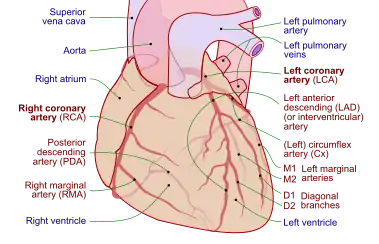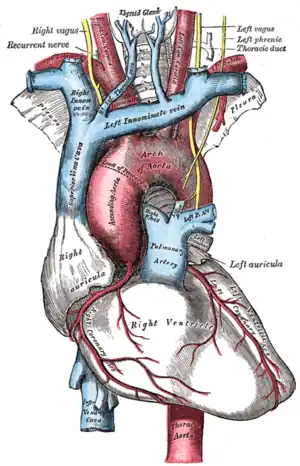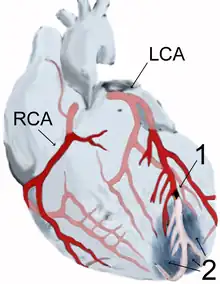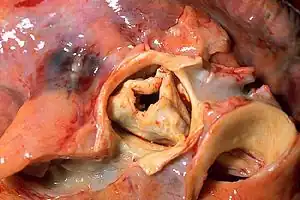Right coronary artery
| Right coronary artery | |
|---|---|
 Blood supply of the heart, with the right coronary artery labelled. | |
| Details | |
| Location | Heart |
| Supplies | right atrium, right ventricle, 25-35% of left ventricle |
| Identifiers | |
| Latin | arteria coronaria dextra |
| Acronym(s) | RCA |
| TA98 | A12.2.03.101 |
| TA2 | 4131 |
| FMA | 50039 |
| Anatomical terminology | |
In the blood supply of the heart, the right coronary artery (RCA) is an artery originating above the right cusp of the aortic valve, at the right aortic sinus in the heart.[1][2] It travels down the right coronary sulcus, towards the crux of the heart.[1][3] It supplies the right side of the heart, and the interventricular septum.[2][4]
Structure
The right coronary artery originates above the right aortic sinus above the aortic valve.[1][2] It passes through the right coronary sulcus (right atrioventricular groove), towards the crux of the heart.[1][3] It gives off many branches, including the posterior interventricular artery, the right marginal artery, the conus artery, and the sinoatrial nodal artery.[5]
Segments
- Proximal: starting at RCA origin, spanning half the distance to the acute margin[6][7]
- Middle: from proximal segment to the acute margin[6][7]
- Distal: from middle segment to origination point of the posterior interventricular artery, where the posterior interventricular sulcus meets the atrioventricular groove on the base of the heart.[6][7]
Variations
In approximately 80% of patients (Right Dominant), the RCA gives off the posterior descending artery (PDA). In the other 20%, of cases (Left Dominant or Codominant), the PDA is given off by the left circumflex artery or is supplied by both the right coronary artery and the left circumflex.[8] The PDA supplies the inferior wall, ventricular septum, and the posteromedial papillary muscle.
The RCA also supplies the SA nodal artery in 60% of people. The other 40% of the time, the SA nodal artery is supplied by the left circumflex artery.
Although rare, several anomalous courses of the right coronary artery have been described including origin from the left aortic sinus.[9]
Function
The right coronary artery supplies oxygenated blood to the right atrium, the right ventricle, and the posterior third and inferior end of the interventricular septum.[2][4] It may also supply 25% to 35% of the left ventricle (LV).
There is significant overlap of supply of the coronary arteries.[2] The right coronary artery is dominant over the left coronary artery 50% of the time, equal to it 20% of the time, and less significant than it 30% of the time.[2]
Additional images
 Right coronary artery
Right coronary artery The arch of the aorta, and its branches.
The arch of the aorta, and its branches. Diagram of a myocardial infarction.
Diagram of a myocardial infarction.
 Human heart with coronary arteries
Human heart with coronary arteries Fetal heart - right coronary artery
Fetal heart - right coronary artery
References
- 1 2 3 4 Aggeli, Constantina; Mavrogeni, Sofia; Tousoulis, Dimitris (2018-01-01), Tousoulis, Dimitris (ed.), "Chapter 3.5.1 - Non-invasive Imaging Techniques in Coronary Artery Disease", Coronary Artery Disease, Academic Press, pp. 337–358, doi:10.1016/b978-0-12-811908-2.00017-9, ISBN 978-0-12-811908-2, retrieved 2020-11-20
- 1 2 3 4 5 6 Pappano, Achilles J.; Gil Wier, Withrow (2013-01-01), Pappano, Achilles J.; Gil Wier, Withrow (eds.), "11 - Coronary Circulation", Cardiovascular Physiology (Tenth Edition), Philadelphia: Elsevier, pp. 223–236, doi:10.1016/b978-0-323-08697-4.00011-3, ISBN 978-0-323-08697-4, retrieved 2020-11-20
- 1 2 Sivananthan, M. (2018-01-01), "Coronary Anatomy", in Vasan, Ramachandran S.; Sawyer, Douglas B. (eds.), Encyclopedia of Cardiovascular Research and Medicine, Oxford: Elsevier, pp. 691–699, doi:10.1016/b978-0-12-809657-4.99738-2, ISBN 978-0-12-805154-2, retrieved 2020-11-20
- 1 2 Schipper, Paul; Sukumar, Mithran; Mayberry, John C. (2008-01-01), Asensio, JUAN A.; Trunkey, DONALD D. (eds.), "Pertinent Surgical Anatomy of the Thorax and Mediastinum", Current Therapy of Trauma and Surgical Critical Care, Philadelphia: Mosby, pp. 227–251, doi:10.1016/b978-0-323-04418-9.50037-0, ISBN 978-0-323-04418-9, retrieved 2020-11-20
- ↑ Antonopoulos, Alexios S.; Siasos, Gerasimos; Antoniades, Charalambos; Tousoulis, Dimitris (2018-01-01), Tousoulis, Dimitris (ed.), "Chapter 2.1 - Functional Anatomy", Coronary Artery Disease, Academic Press, pp. 121–126, doi:10.1016/b978-0-12-811908-2.00008-8, ISBN 978-0-12-811908-2, retrieved 2020-11-20
- 1 2 3 Villa, AD; Sammut, E; Nair, A; Rajani, R; Bonamini, R; Chiribiri, A (28 June 2016). "Coronary artery anomalies overview: The normal and the abnormal". World Journal of Radiology. 8 (6): 537–55. doi:10.4329/wjr.v8.i6.537. PMC 4919754. PMID 27358682.
- 1 2 3 Kini, S; Bis, KG; Weaver, L (June 2007). "Normal and variant coronary arterial and venous anatomy on high-resolution CT angiography". AJR. American Journal of Roentgenology. 188 (6): 1665–74. doi:10.2214/AJR.06.1295. PMID 17515392.
- ↑ Shahoud, James S.; Ambalavanan, Manoj; Tivakaran, Vijai S. (2020). Cardiac Dominance. StatPearls Publishing. PMID 30725892.
- ↑ Angelini, P. (15 July 2014). "Novel Imaging of Coronary Artery Anomalies to Assess Their Prevalence, the Causes of Clinical Symptoms, and the Risk of Sudden Cardiac Death". Circulation: Cardiovascular Imaging. 7 (4): 747–754. doi:10.1161/CIRCIMAGING.113.000278. PMID 25027456.
External links
- Overview at Cleveland Clinic
- 00462 at CHORUS
- thoraxlesson4 at The Anatomy Lesson by Wesley Norman (Georgetown University) (heartantmajorvessels)
- Anatomy figure: 20:03-04 at Human Anatomy Online, SUNY Downstate Medical Center - "Anterior view of the heart."